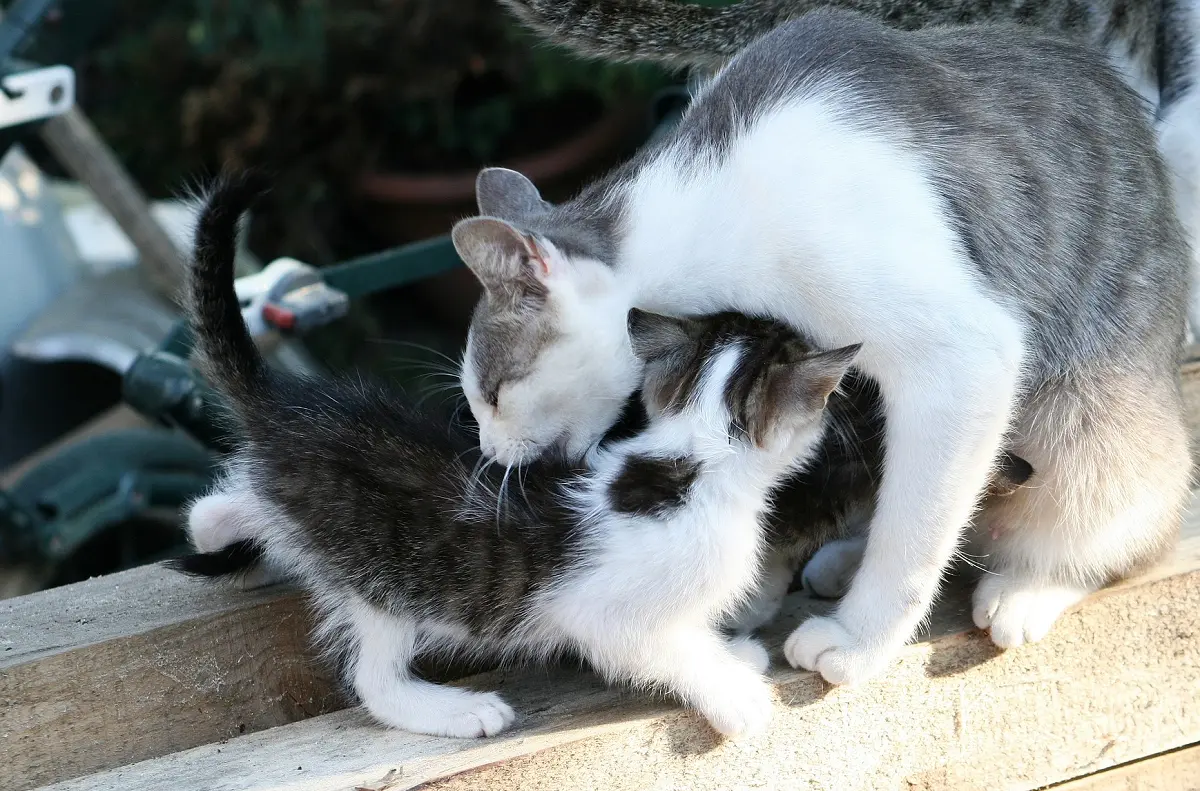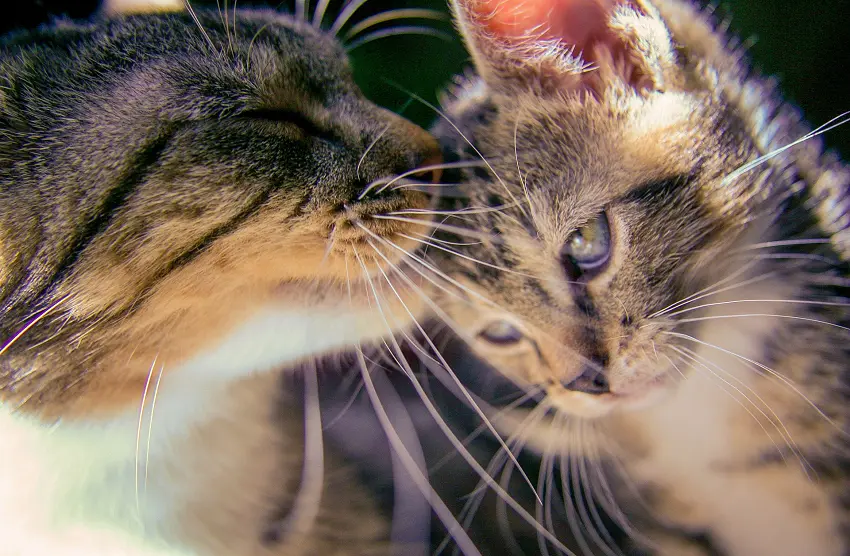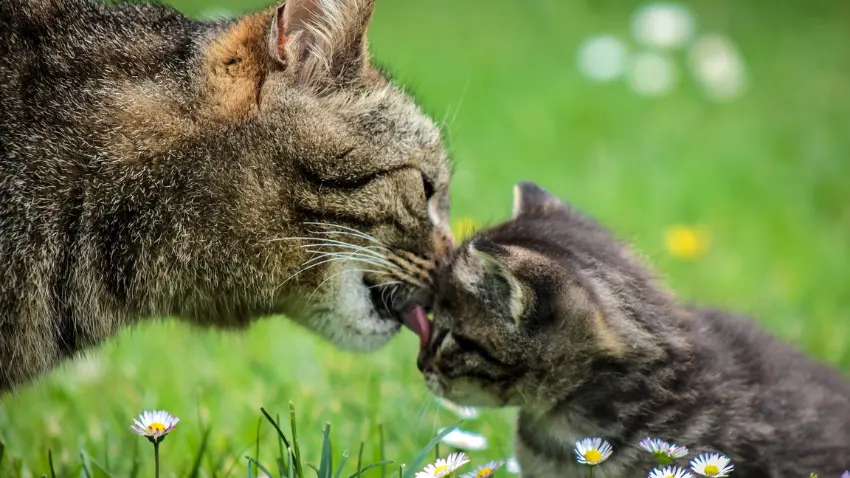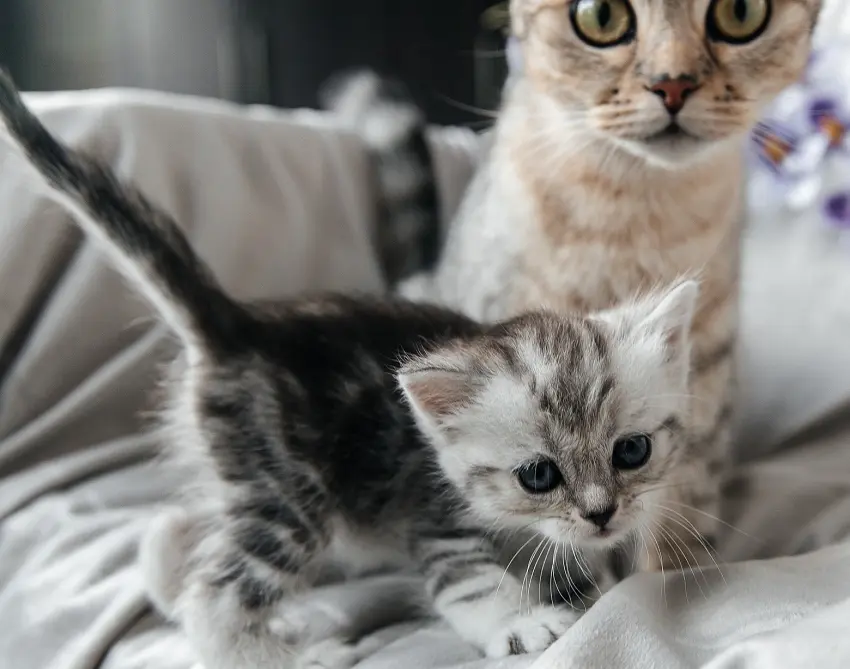How To Stop a Cat From Moving Kittens Around the House
Mother cats will often move their kittens whenever they sense danger or stress. This will make it difficult for the owners to look after the litter and ensure that all the kitties are fine. With this, knowing how to stop a cat from moving kittens around the house. Keeping the area calm, safe, and away from foot traffic is important so the mama cat won’t feel the need to evacuate her babies.
Why do mother cats keep moving their kittens?
For you to succeed in stopping a mother cat from moving its kitten, you should first know why they are doing it in the first place. The following are the reasons why mother cats would move their litter to a new place:


- She feels unsafe. One of the most common reasons why mother cats would move their litter is because of insecurity. This is triggered by bright lights, noise, foot traffic, and similar disturbances.
- You touched the kittens. While some domesticated cats are fine with you touching their litter, others won’t. The human scent on the kittens may stress a mother cat, which will force it to move the litter.
- The nest is too small. Another reason why mother cats move their kittens is that the initial nest is already small for the growing litter. This happens a lot in the third or fourth week when the kittens are stronger and bigger.
- The area isn’t comfortable. Mother cats can be very picky with the texture of the area where they keep their litter. If the surface is too rough or the smell isn’t appealing, she will likely move the litter somewhere else. It’s also possible that the area has become colder.
- The area is soiled. Lastly, mother cats will move their kittens out of their nesting place if it’s already soiled because of the litter’s poo and pee.
How to stop a cat from moving kittens?
It’s not easy to stop a mother cat from moving her kittens. It’s her instinct and way of protecting the litter. Still, you can reduce the likelihood of this behavior by doing the following steps:

Mother cat knows best
In the first four weeks of the kittens’ life, it’s best to let the mother cat do its thing. The kittens are still fragile and must never be separated from their mother.
If you need to bring the kittens and mother cat to the vet, wear a pair of gloves to avoid transferring your smell to the litter. Some cats will be fine if you touch their kitties so it depends on your furball’s personality.
Unless the mother is unfit to fulfill its duties to the litter, you don’t really have to intervene. Just monitor everyone’s progress and watch out for any potential problems.
Offer a new spot
If you notice that the mama cat is frantic and planning to move the kittens, offer a warm and cozy spot. This way, you can control where your cat moves its kittens. This will also reduce the stress on the part of the mother feline.
Make the mother cat and litter comfortable on the new spot. If your cat wants to move the kittens again, keep offering a spot. You can also experiment with the things you put in the nesting place to see which your feline prefers for its babies.
Limit the mama cat’s access
Before your cat gives birth, it’s best to limit its access around the house. This way, it will be easier for you to find the kittens in case the mama cat moves them. And during the delivery day, you should keep the mother cat in a quiet room.
Take note that mother cats can be in labor for as long as 30 hours. So if she keeps moving the litter, it could mean that she’s still about to give birth to more kittens. I suggest letting the mama cat stay in a quiet room for a whole day until you’re sure that she had all the kittens. Besides, previous checkups with the veterinarian will give you an exact count of how big the litter will be.
Keep it calm
Cats have heightened senses so the noise around would be very stressful for mother cats. You should keep your home as calm as possible to prevent the mother cat from moving its kittens. Remove any possible stressors that may push the mother cat to evacuate its babies.
If you have small kids, it’s best to keep them away from the kittens. As you know, kids love gripping and mouthing things. You wouldn’t want it to happen to the kittens.
Clean it always
You should keep the nesting area of your cat clean so it won’t move the kittens away. However, you shouldn’t overclean it. Avoid using soaps and cleaning agents since these have a strong odor. Also, cleaning agents are toxic and they can put the kittens’ life at risk.
Instead, I suggest using pee pads so you can toss the used ones and place a fresh layer after. Soft blankets are also an ideal option.
You should only remove the fecal matter and allow the cat smell to linger. This way, the mother cat won’t feel threatened due to the new smell.
Feed the mother cat well
Lastly, make sure that the mother cat is well-fed. In the wild, cats forage for food. And if it takes them long distances to find food, they will move their kittens somewhere close to the source.
In a domesticated setting, you should keep the mother cat’s water and food bowl right next to its kittens. This way, she can eat while staying close to her babies. It will also allow the mother cat to introduce her kittens to the cat food once they are big enough.
Do you have to keep male cats away from kittens?
Generally, veterinarians recommend keeping male cats away from the kittens, even if they are the father. Besides, father cats don’t have any role to play in the growth of the kittens. It’s best just to let the mother cat tend to the kittens until they can be weaned. From there, you can introduce the father cat.
Regardless, the male feline is the father or not, tomcats are known to kill kittens. This is because getting rid of the litter will free the mother cat’s time. It sounds sinister, but that’s how it works with some male cats. Remember that male felines are territorial and can be sexually aggressive. They tend to fight anything that will hinder them from mating a female cat in heat.
So as much as possible, keep any male cat away from the kittens. This will also prevent the mother cat from moving its kittens to a safer place.
Will cats move their kittens if you touch them?
It depends on the personality of the mother cat. Domesticated mother cat will not mind you touching her kittens. Still, the ASPCA recommends that you wait for two weeks before handling the kitties. This way, the litter has grown a bit and can endure some level of stimulation.
However, if the mother cat seems agitated, it’s best not to touch the kittens yet. This might lead the mama cat to transfer her litter.
Why does my cat keep moving her kittens to my bed?

For the most part, mother cats will tuck their litter in a hidden spot. But if it’s bringing the kittens to your bed, it probably associates you with safety and comfort. The mama cat trusts you and knows that you will protect the furbabies.
This can also be a call for help when the mama cat needs a break from taking care of her babies. The cat expects you to look after the kittens while she rests and takes some me-time for herself.
If the mother cat is older than most, bringing the kittens to your bed means that she needs help. As an old kitty, she may not be strong enough to tend to all the kittens, especially if she had a large litter.
Lastly, mother cats will bring a kitten to your bed if it’s weaker than other members of the litter. This is because the mama cat knows that you can make it feel better.
How far will a feral cat move her kittens?
With feral cats, it can be tricky to know how far they will move their kittens. It also depends on how large the area is and if there are available hiding spots for the litter.
But if there are kittens left on the initial nesting area, it’s possible that the mama cat has moved the others somewhere near. Take note that mother cat can be distracted in the course of moving her kittens. It can be the presence of a predator, sudden changes in the environment, and other elements.
If you want to help a feral cat and its litter, it’s best to coordinate with a local animal shelter. You’ll never know if the mama kitty is aggressive or has infections.
Why does my cat move only one kitten?
There are many reasons why a mother cat only moves one kitten all the time. First, that kitten might be the runt of the litter. As the weakest, the mama cat will often dump the runt to prevent the spread of any potential illnesses within the litter. Also, it’s perceived that mother cats think that the runt has lower chances of surviving, therefore not worth their efforts.
However, it’s also possible that the litter is too big for the mother cat to handle. With this, she might decide to pick one and abandon it someplace. This happens a lot if the mama cat is feeding too many kittens that it’s already starting to run out of milk.
It’s important to monitor this behavior so you can intervene in case the mother cat rejects one kitten. You would need to bottle-feed the kitten with special milk formula. This way, it will survive despite being rejected by the mother cat.
Conclusion
Knowing how to stop a cat from moving kittens is important. If your cat moves kittens to an unknown place and you can’t find them, some or all kittens may suffer if neglected by the mother cat.
If you notice your cat moving kittens, you should be patient and calm to prevent stress. You can also consult with the vet about the best thing that you can do in specific circumstances. As much as possible, let the mama cat do its thing and assist whenever it’s needed.
I hope the information from this article will help you take care of your cat and the newborn kittens.
Thank you for reading!
